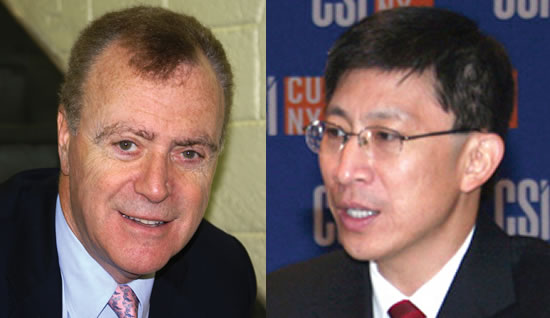GUEST EDITORIAL
Education In The Computer Era
By Headmaster Ronald P. Stewart & Dr. Charles Liu

(L-R) York Prep Headmaster Ronald P. Stewart & Professor Dr. Charles Liu, College of Staten Island
Facts are more quickly available to students than at any time in human history. If you want to find out the weekday of the D Day landings (Tuesday), look it up on Wikipedia. Similarly, if you want to find Boyle’s law in physics, or the value of pi squared, be sure that Google will give you the answer. At one time, it was considered important that we memorized facts; that time seems to be passing.
So the question is how education needs to change to deal with the technological marvel of fact production on demand. We are sure that the focus has to be on our creative thinking ability and our understanding of reasoning. Because if all you learned from a class was something that you can look up on your computer, then, for me, that is NOT a good class. We are thought machines not fact machines. We need to teach thinking and expression of those thoughts, and that means teaching writing and speaking skills. Machines, powerful as they are, do not have our imagination, humor or compassion. They do not have the ability to create sublime works of art and music, or scientific theories and feats. Dr. Liu quoted Einstein who said that we have the feeling of mystery and wonder. Machines do not!
It is certainly true that, for a long time, educational reformers have been trying to help us think rather than just replicate learned facts. They have suggested that we move away from exams that merely test your memory. We think we need to change the nature of our exams. Students still need to write but we should allow them to bring their computers to find the factual knowledge they no longer need to memorize. We are, after all, not trying to teach students to be a “Google” machine. Clearly the new criteria should be how you synthesize and creatively use facts, transforming information into wisdom and understanding. And one way to do that is to ask oneself critical questions. Socrates had it right; only through constant questioning can we gain insight.
We recognize that there are exceptions to my over-simplification. The teaching of foreign languages inevitably involves some memorization. But let it be noted that our cell phones can instantly translate, and that although being multilingual is certainly the sign of a well-educated person, in the end that may just be a conceit. We love great translations; Stefan George’s translations of Shakespeare are masterpieces in themselves. We just wonder how long before a machine can translate better. They said that machines will never beat a chess master. They were wrong.
We also recognize that memory is a mental ability that has great value. While the computer can multiply, few would dispute that learning one’s multiplication tables is an important part of becoming educated. Just as is memorizing some poems and learning principles of science. It has always been a source of wonder to me that musicians could memorize a complete concerto, or actors memorize their parts in a long play. That is a great skill which we do not dismiss.
We live in an age of increasing specialization. Scientists, historians, and particularly physicians, seem more and more specialized in their own esoteric field. We have heard historians say to us “that is not my period!” And, to be fair, we have also heard scientists say the complete opposite which is that we need to study the “big picture” to understand the immediate scientific challenge. Using tools and ingenuity, we humans have advanced so that we can affect our environment. As the technology rapidly changes, we, in the field of education, have to adjust to match new innovations. It is no longer the printing press or the internal combustion engine; today it is the touch pad and search engine. So, in that context, we need to refocus our efforts on helping students acquire the skills of critical thinking, questioning, and communicating. A task is always easier if the goal is clearly known, and this should be our new mission. #
Ronald P. Stewart is the Headmaster of York Prep School. Dr. Charles Liu is the Director of Macaulay Honors College and Professor of Astrophysics, College of Staten Island.
